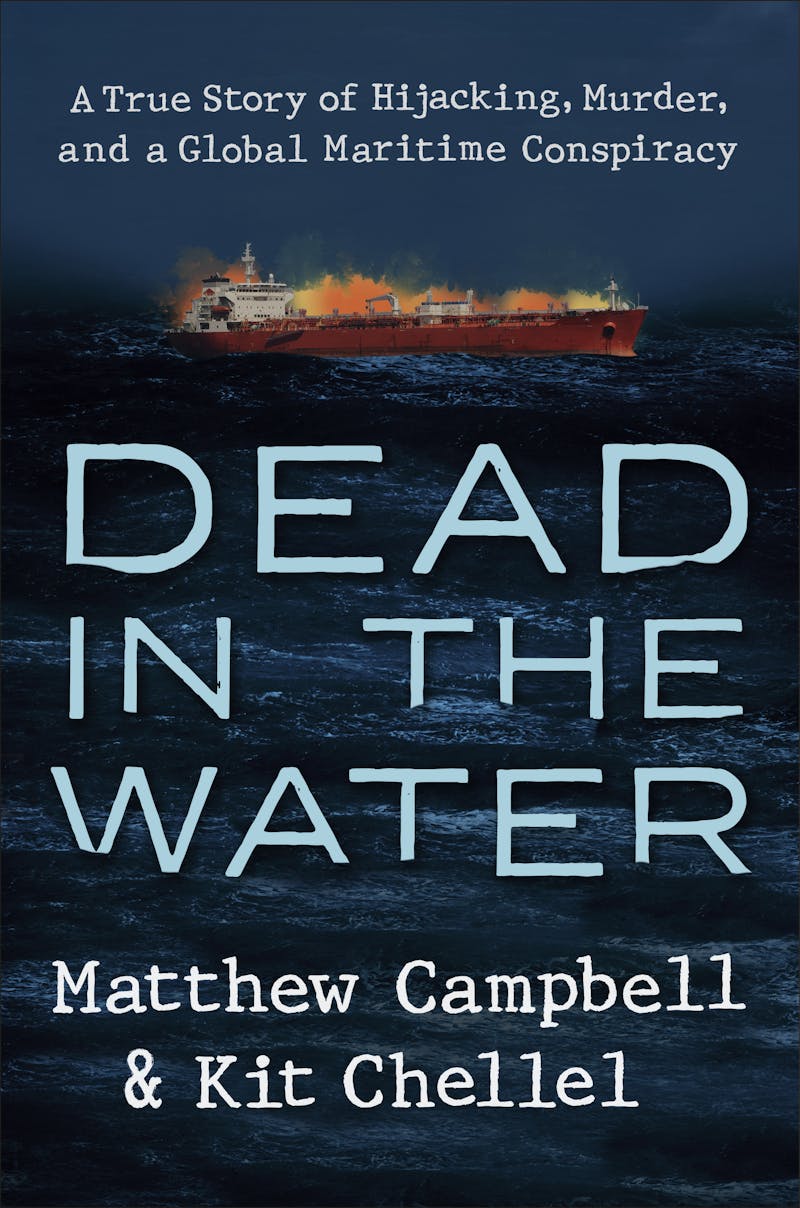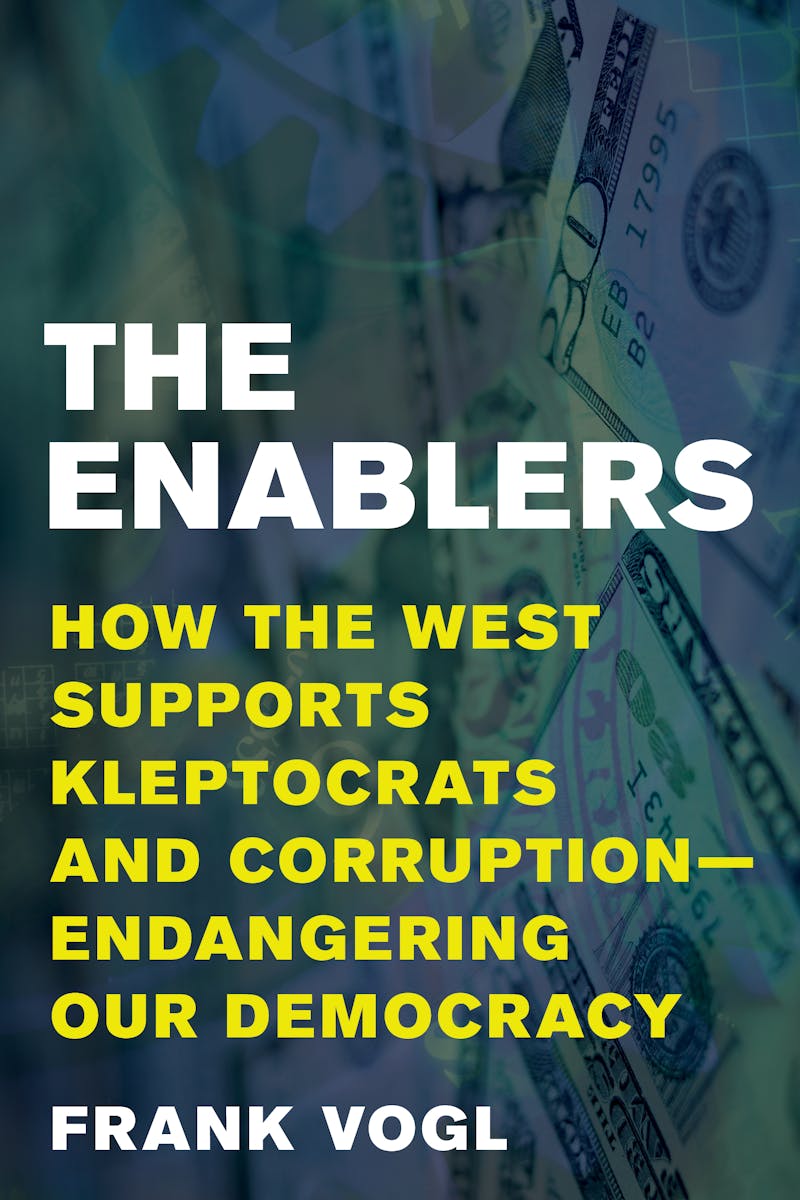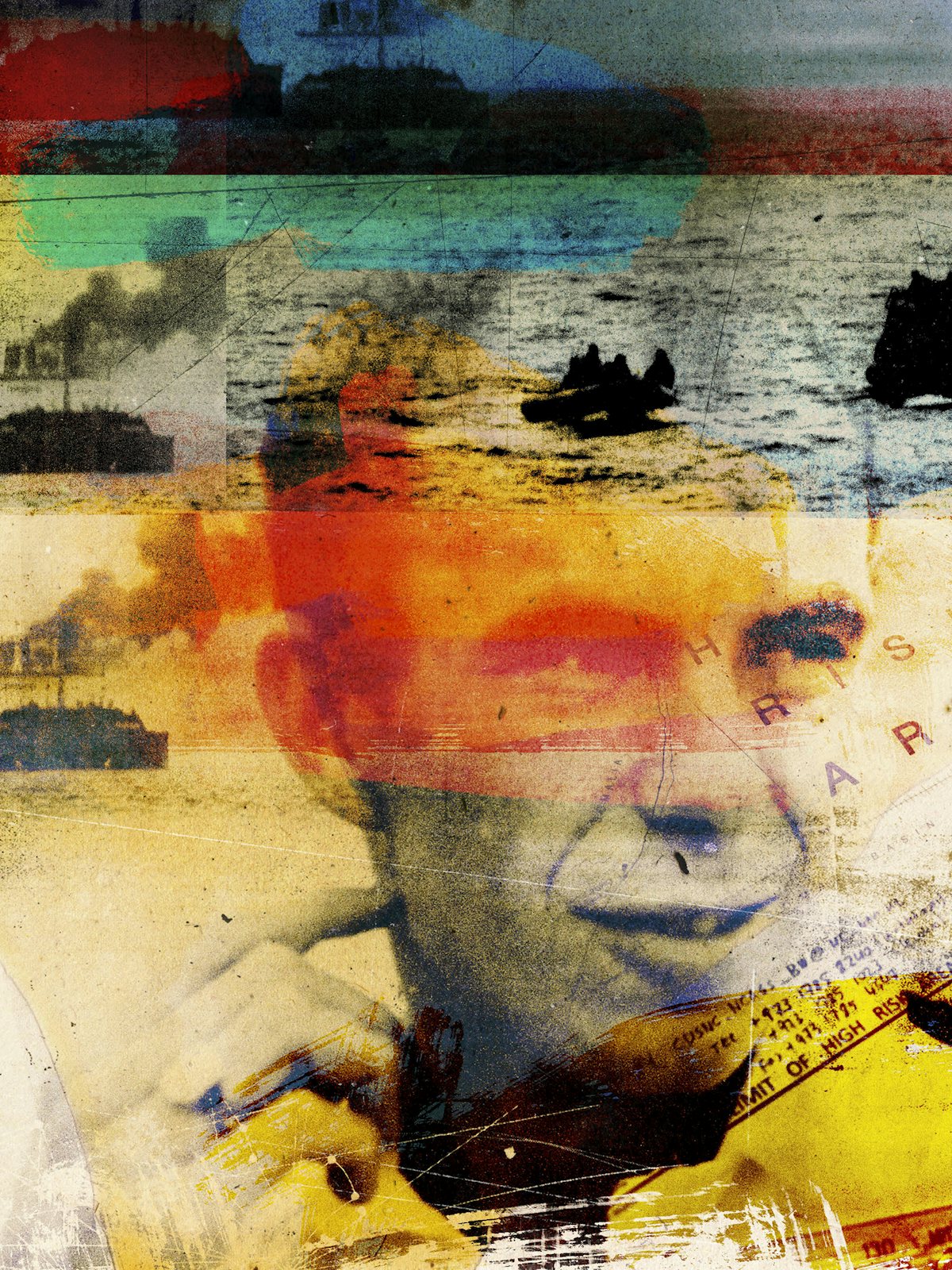In July 2011, David Mockett was dividing his time between Yemen, where he worked as a marine surveyor, and England, where he, his wife, and two adult daughters lived. His job was to conduct independent investigations of incidents at sea for any one of the many interested parties when something goes wrong on a large commercial vessel—in this case, for insurers at Lloyd’s of London who wanted his assessment of an apparent incident of piracy involving an oil tanker named the Brillante Virtuoso, which had been boarded and then set ablaze in the middle of the night while traveling through the Gulf of Aden.
The ship itself was worth about $55 million, and the oil in the hull was valued at around $100 million—each covered by separate syndicates of insurers from Lloyd’s that would be on the hook for whatever could not be recovered through expensive salvage and retrieval operations. The stakes were high, even if the incident—a potential hijacking by Somali pirates gone wrong in this commercially vital but dangerous stretch of water—was not entirely unprecedented. Mockett, however, was skeptical: The forensic evidence did not sync up with the account of key witnesses on the boat, and the captain had not followed basic anti-piracy procedures. About a week after Mockett began asking pointed questions about what had happened, he was killed in a car bombing in Yemen.


These two mysteries—what actually happened to the Brillante Virtuoso, and who killed David Mockett?—are the subject of Dead in the Water: A True Story of Hijacking, Murder, and a Global Maritime Conspiracy by Matthew Campbell and Kit Chellel, two reporters for Bloomberg who have been investigating the events since 2016 and wrote about it in a feature for Bloomberg Businessweek in 2017. The book is an expertly constructed crime thriller—the sort of work of narrative nonfiction that seems destined for a film adaptation, thanks to a twisty story that unfolds largely through the eyes of two self-consciously grizzled investigators as they encounter various obstacles, questionable leads, courtroom setbacks, and risk-averse insurers and corporate lawyers. (Corporate lawyers and insurers almost invariably come out looking bad in these stories, since their principal objective—saving money—does not always align with the fact-finding imperative.)
But the book is also an unexpected case study in the way that fraud has permeated the global economy, undermining democratic governance by both feeding off and facilitating government corruption. The death of David Mockett illustrates how corruption moves in international systems, stretching from Yemen to Greece to the United Kingdom, and how it can impede the most basic efforts to maintain the rule of law throughout the world. And, as Frank Vogl’s new book, The Enablers, shows, government corruption relies heavily on elites in liberal democracies: “the armies of financial and legal advisors, real estate and luxury yacht brokers, art dealers and auction house managers, diamond and gold traders, auditors, and consulting firms, based in London and in New York and in other important global business centers, who aid and abet the kleptocrats in return for handsome fees.”
For decades, the story that many people have liked to tell about the global economy is one of frictionlessness—of the way that open markets can improve the well-being of people across the world by making it easier for us to transact with one another. In different ways, Dead in the Water and The Enablers illuminate how fractious the reality is. Global markets are increasingly riven with fraud and government corruption, and that malfeasance is both a cause and an effect of anti-democratic forces across the globe.
What happened to David Mockett is both not terribly complicated and not yet resolved. The destruction of the ship is a classic story of insurance fraud—almost literally classic, since, as Campbell and Chellel explain in one of many informative digressions, “the first documented case of maritime insurance fraud” dates to “around 360 BC” and was memorialized by “the Greek orator Demosthenes.”
In the case of the Brillante Virtuoso, we eventually find out that it was the ship’s owner, a Greek tycoon named Marios Iliopoulos, who orchestrated the devastation of the vessel in order to get out from under a massive financial debt. To pull it off, he enlisted a small group in Yemen, led by a Greek businessman named Vassilios Vergos, who worked in ship salvage operations. The first part of the plan required members of the Yemeni coast guard to pose as pirates one evening while the Brillante Virtuoso was moving through the Gulf of Aden. They were able to board the ship because the captain and chief engineer were also in on Iliopoulos’s scheme and effectively waved them onboard while other members of the crew were left puzzled. The men posing as pirates then engineered an explosion on the ship to make it look as if there had been some sort of accident in the course of trying to take the ship and its crew hostage, when in fact they were deliberately trying to destroy the ship so that Iliopoulos could obtain proceeds under his insurance policy with Lloyd’s. After the ship went up in flames, one of the crew sent out a distress call, and an American cruiser in the area—the USS Philippine Sea—quickly arrived and took the crew onboard.
To ensure that all went to plan, Iliopoulos also recruited Ahmed Nashwan, a Yemeni who was “rumored to be a veteran of the Republican Guard, the branch of the Yemeni military closest to” then-President Ali Abdullah Saleh. Nashwan was a bit player but a vital one, reportedly taking millions of dollars “to cover his role, and to secure the cooperation of Aden’s power brokers,” because “if the Greeks wanted to operate on Yemeni turf, then the Yemenis would need to be cut in.”
The scheme might have worked beautifully, had David Mockett not entered the picture. Within days of the incident, a firm hired by the insurers asked Mockett to visit the ship. He traveled to the site with Vergos and a man named Dimitrios Plakakis, who was working on Vergos’s salvage business but had refused to get involved in the sabotage of the ship itself. During the investigation, Mockett expressed doubts about the piracy story within “earshot of many” on board. Vergos offered him some “unsolicited counsel”: “At your age,” he said, “it’s better to stay with your grandchildren.” He also later urged, “You can go back to your country and enjoy your grandchildren.” Within days, Mockett was dead, and Vergos later told Plakakis, “I told him to stay with his grandchildren.”
Now a second inquiry began: Lloyd’s hired two more investigators, Richard Veale and Michael Conner, to continue Mockett’s work. As the book follows their efforts, it makes accessible the routine but dizzying complexities of modern financial fraud—replete with shell companies, internationally dispersed bank accounts, and foreign governments that either cannot or will not make serious headway in preventing corporate malfeasance that, in the extreme case of the Brillante Virtuoso and Mockett, can have the most serious of tangible, nonpecuniary consequences. Nothing in Veale and Conner’s investigation was straightforward. The Brillante Virtuoso, Campbell and Chellel explain, was owned by a company incorporated in “the Pacific tax haven of the Marshall Islands,” and that company was “in turn owned by a Greek family based in Piraeus, just outside Athens.” The ship sailed “under the flag” of Liberia, which provides “cheap, hassle-free registrations to about one in ten of the world’s commercial vessels”—though, by historical quirk, Liberia’s registry is actually overseen by “Israeli-American entrepreneurs operating out of a headquarters in Dulles, Virginia.” This was all part of “a system that had evolved over the previous six decades to eliminate financial and regulatory friction at every opportunity.”
After about six years of investigation, Veale and Conner finally made a breakthrough. In 2017, they learned Plakakis had relocated to London, and that he had been talking to the City of London Police as part of a fraud investigation that officials were conducting. Plakakis eventually testified before the court overseeing the insurance dispute, while he was under the protection of law enforcement, and described how Iliopoulos, Vergos, Nashwan, and others had orchestrated the sabotage of the Brillante Virtuoso as an insurance fraud. The presiding court agreed that they had perpetrated a fraud and issued an opinion ruling in favor of the insurers in the civil case (which concerned whether the insurers needed to pay out from the policy), yet the criminal investigation ultimately stalled. Campbell and Chellel write that the City of London’s investigation “appeared to have sputtered out.” After Plakakis’s day in court, there does not appear to have been any further, discernible investigative activity.
The Greek government, for its part, never appeared to take any interest in the matter. In Yemen, the murder of Mockett barely registered. There, Campbell and Chellel write, “Mockett’s death was just one tragedy among millions,” as “civil war, mass starvation, and disease” produced what the United Nations has called “the worst” humanitarian crisis “in the world.” No one has ever been criminally charged anywhere in the world with Mockett’s death. The lack of action appears to reflect both the difficulty of investigating transnational organized crime, as well as the fact that these systems of fraud are so thoroughly enmeshed throughout the global economic system that even developed countries seem reluctant to push too hard on them.
Frank Vogl’s The Enablers—dense and compact, policy-oriented and prescriptive—is the inverse of Dead in the Water in almost every way. Vogl focuses on authoritarian regimes led by kleptocrats who “are pocketing staggering sums of cash, which they move through the world’s financial systems into investments in the wealthiest Western nations.” It’s a subject Vogl knows well. He is co-founder of the global anti-corruption group Transparency International. He also worked as a foreign correspondent for Reuters and The Times of London in the 1970s, as a spokesperson for the World Bank in the 1980s, and, for 25 years, as the head of an international public relations firm representing the sorts of participants in the world of nominally legitimate international finance who are often essential to government corruption.
The forms of corruption he traces are varied and profuse, limited only by the imagination of those involved. Senior government officials in kleptocratic regimes, Vogl writes, are “all too willing to demand kick-backs into their personal accounts from multinational corporations in return for public contracts.” This is how, to take just one example, as much as $30 billion of the money spent by the Russian government on the 2014 Olympics in Sochi wound up in the hands of oligarchs and companies allied with Vladimir Putin.
Vogl describes how kleptocrats steal from public coffers and structure the tax system to favor the rich in exchange for personal reward; how they skim the proceeds from the sale of public assets and natural resources; and how they dole out appointments to run lucrative state-owned enterprises to friends and family who then use their positions to misappropriate revenue both to purchase political support and to line their own pockets. State-owned enterprises—particularly those that operate in the energy sector, like Pemex in Mexico, Eskom in South Africa, and Gazprom in Russia—serve as “piggy banks for kleptocratic regimes.”
But kleptocracy is not a regional phenomenon. Enablers in Western Europe and the United States help kleptocrats launder the ill-gotten gains through the global banking and finance system. One mechanism that has attracted particular attention in recent years is the way in which kleptocrats and oligarchs purchase real estate using offshore-registered holding companies that obscure their owners. In 2015, The New York Times reported that most of the owners of the apartments in the Time Warner Center in New York City had “taken steps to keep their identities hidden, registering condos in trusts, limited liability companies or other entities that shield their names.” Those people included a Russian oligarch “who was barred from entering Canada because of suspected connections to organized crime,” as well as others who had “been the subject of government inquiries around the world, either personally or as heads of companies,” in cases that ran the gamut “from housing and environmental violations to financial fraud.” Figuring this out was no easy task: It took the paper more than a year of searching business and public records from over 20 countries, interviewing dozens of people who knew the inner workings of the building, and analyzing voluminous property records, which often listed relatives or lawyers as the nominal buyers.
Vogl also cites a far different form of “enabling”: Western companies not only launder kleptocrats’ wealth but actually assist them in accumulating it. Over the period from 2004 through 2012, the French bank BNP Paribas processed transactions on behalf of people and entities associated with Sudan, Iran, and Cuba through the U.S. financial system in violation of U.S. sanctions laws. In 2014, the Justice Department obtained a guilty plea from the bank and roughly $9 billion in criminal penalties in a settlement that described some of the ways in which the bank managed to pull this off. BNP Paribas, for instance, used a system of “satellite banks” to serve as intermediaries with U.S. financial institutions for transactions conducted by its Sudanese clients, including the very government officials who, as Vogl notes, were at the time “overseeing wholesale ethnic cleansing, rape, and murder in Darfur.” These satellite banks—which could freely transact with U.S. banks—served as undisclosed proxies for sanctioned Sudanese entities and individuals.
More recently, in late 2020, Goldman Sachs paid several billion dollars as part of a criminal settlement with the Justice Department to resolve an investigation into its dealings with government officials from Malaysia and Abu Dhabi. According to court documents, between 2009 and 2014, Goldman paid more than $1.6 billion in bribes to government officials in order to secure lucrative business working on behalf of a Malaysian state-owned development fund known as 1MDB. The bribes were paid using money that a Goldman executive diverted from multiple projects with the assistance of a well-connected Malaysian businessman named Jho Low.
Vogl says that “annual illicit cash inflows” in the United States alone are “around $600 billion,” and he cites economists at the International Monetary Fund who have estimated that global corruption accounts for upward of 2 percent of global GDP. These sorts of estimates often feel casually tossed off; the amounts are difficult to measure precisely because of the lack of government resources that the United States and its allies have invested in evaluating, much less actually addressing, these problems. As Vogl and other anti-corruption advocates argue, these figures represent more than just shady dealings and financial malfeasance; they are essential to the continued functioning of authoritarian regimes.
The proximate victims of kleptocratic regimes, as Vogl writes, are their countries’ own citizens, who are impoverished while “elites live in grand luxury” on stolen wealth. But the same system that enables kleptocracy abroad has also made Western democracies less accountable and more susceptible to corruption.
Over the last two decades, the avenues for government corruption in the United States have grown, due to a series of rulings by the Supreme Court that have made our campaign finance system largely inscrutable and that now allow wealthy individuals and corporations to do pretty much whatever they want in the way of influencing elections and politicians if they check the right boxes and use the right legal entities. In parallel, the court effectuated a remarkable narrowing of what counts as corruption in the executive branches of our federal and state governments. Our systems of corruption, influence, and public profiteering tend to be more subtle than those in foreign countries, but the same ethos is what led the Supreme Court to unanimously reverse the conviction of Republican former Virginia Governor Bob McDonnell after he was found guilty of taking nearly $200,000 in gifts from a businessman trying to secure regulatory approval for a diet supplement. It allowed Donald Trump to skim taxpayer dollars throughout his presidency by forcing the federal government to incur exorbitant expenses to provide security protection to him at his own properties. And it has created a bizarre congressional status quo in which members of Congress are free to deliver publicly funded government subsidies to companies in which they hold stock or maintain other ownership interests.
Vogl is admirably frank about the principal impediments to anti-corruption efforts here and abroad: money and resources. There is no shortage of good ideas and well-intentioned government officials and private citizens, but, as Vogl notes, what is really needed is a “quantum upgrade in enforcement capabilities”—ideally everywhere, but at least in our own country if we ever intend to be serious about these problems.
This would mean, among other things, dramatically increasing the budgets at the Justice Department and at regulatory enforcement agencies like the Securities and Exchange Commission. It would also mean, relatedly, working hard to shift the composition of the relevant workforce, by, for instance, increasing the number of analysts and agents with expertise conducting financial tracing (which is crucial in cases involving international financial systems), and vigorously pursuing efforts to improve international information- and evidence-sharing among our government and foreign law enforcement agencies.
Perhaps what is most disturbing about Dead in the Water and The Enablers is the deeply entrenched nature of the status quo both portray. They show not just how international commerce has complicated what should be uncontroversial law enforcement imperatives—like investigating a murder—but the nature and complexity of the globally interconnected networks of governmental and financial power that allow government officials all over the world to steal from their constituents with relative impunity, both here and abroad. We are nowhere near the place—both domestically and in concert with our international allies—that would be necessary to put a serious dent in the problem, thanks to both resource limitations and international realpolitik. In the meantime, we are left, seemingly helpless, watching our domestic and international politics corroded by the allure and forces of luxury and greed.




